Ash Egan
In the early 2000s, journalists popularized the term “PayPal mafia” to describe the PayPal founders and employees who left to start their own wildly successful tech companies, including Peter Thiel, Reid Hoffman, and Elon Musk. Drawing from that idea, this article seeks to cover the formation and flow of talent within the crypto landscape today.
I'm fascinated by the concept of tech mafias, popularized by Paypal in the early 00s.
Early signs of crypto mafias:
Coinbase ➡️ @0xProject @dydxprotocol
Ethereum/ConsenSys ➡️ @Cardano @polkadotnetwork @metamask_io
MIT ➡️ @EnigmaMPC @Algorand Unit-e
IC3 ➡️ AvalancheOthers?
— Ash Egan (@AshAEgan) April 3, 2019
The crypto world is in a constant state of flux, with new startups entrants joining the industry every single day. These new startups have the potential either to be superstars within a portfolio company or to start the next Coinbase. Additionally, there are already impressive spin-outs from some of the more established crypto companies.
For ease of framing, I’ve separated these early-forming mafias into four categories: Crypto, Tech, Wall Street, and Academia. Since 2009, there have been 186 spinout companies originating from those four categories (33% from Academia, 28% from Crypto, 24% from Tech, and 15% from Wall Street).
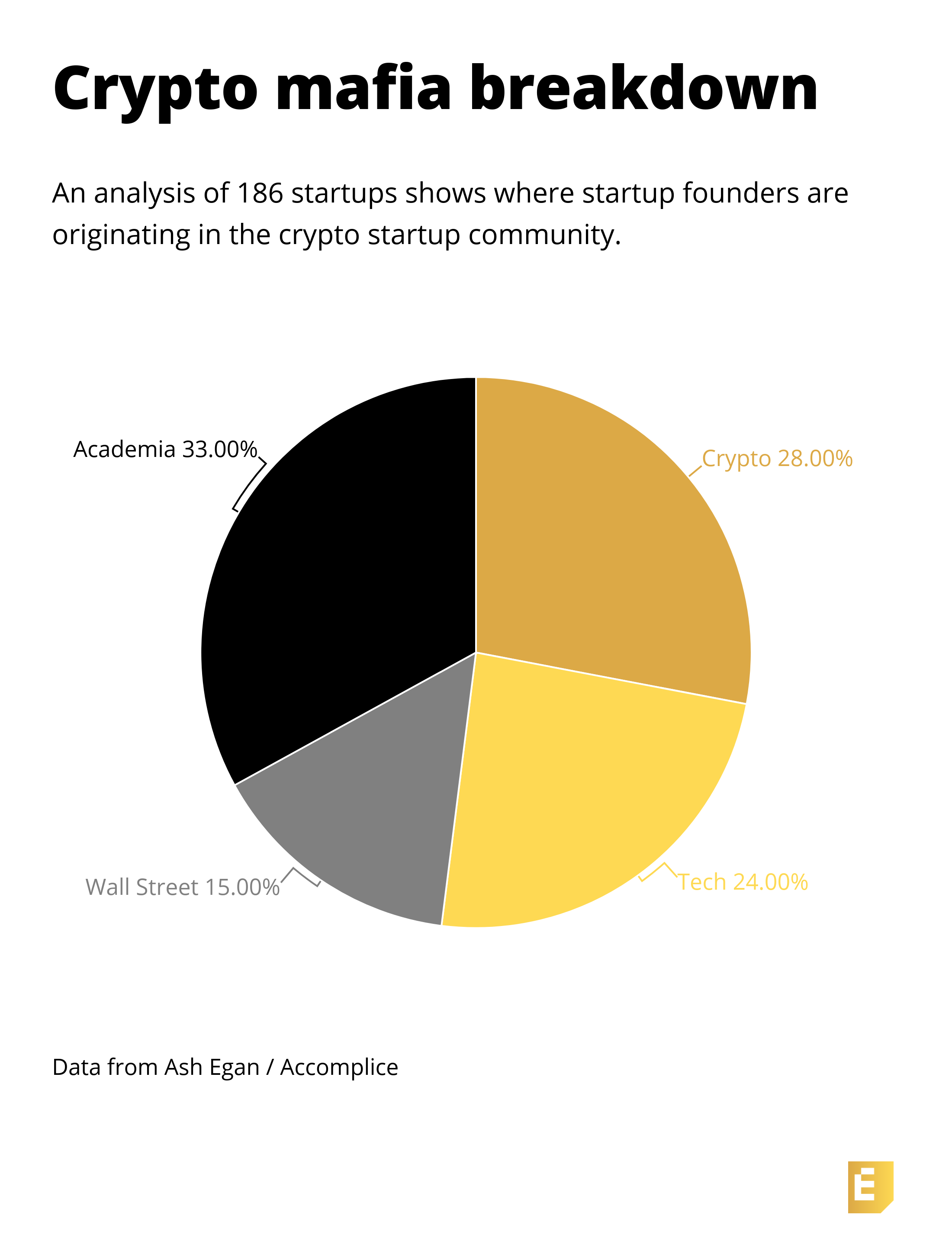
Obvious but important disclaimer: this article does not intend to promote organized crime within crypto.
Criteria
Before we begin, here is the general breakdown of the early “Crypto Mafia” and the criteria I used to evaluate.
- Founder must have attended or worked longer than six months in her prior organization to be considered, so summer internships are not considered in this research.
- To be considered, at least two notable companies (or funds) spun out of the “mafia” company or university.
- A founder’s past employment or education was not considered if prior to 2009 (Bitcoin launch).
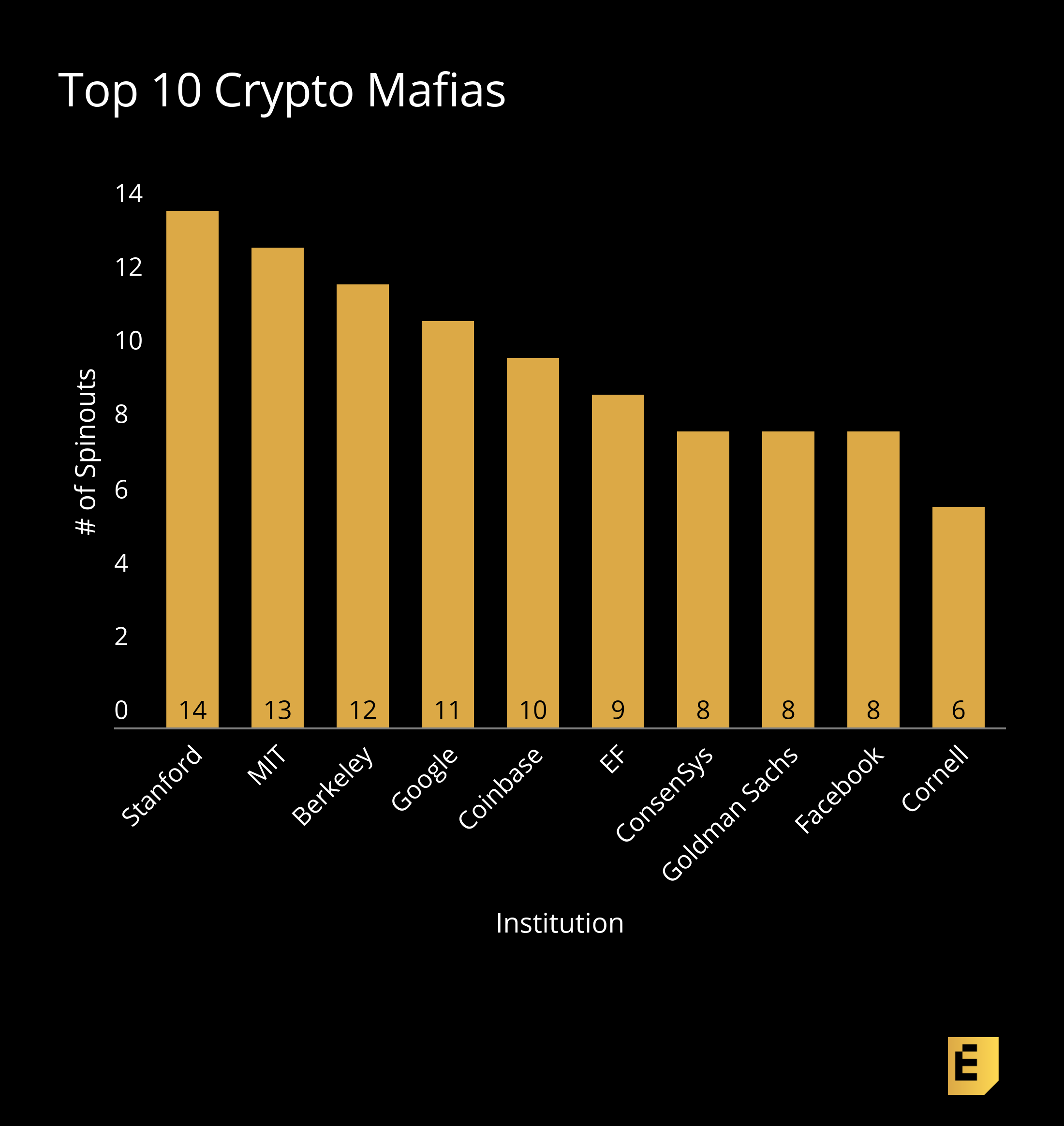
Top emerging mafias from the crypto world
Coinbase
San Francisco-based Coinbase, most recently valued at $8 billion, has just as impressive of a valuation as it does alumni spinouts. Coinbase alums have gone on to start crypto funds, protocols, dapps, and crypto-enabled businesses.
Notable examples include Polychain (Olaf Carlson-Wee), Paradigm (Fred Ehrsam), DyDx (Antonio Juliano), Scalar Capital (Linda Xie, Jordan Clifford), 1Confirmation (Nick Tomaino), TruStory (Preethi Kasireddy), District0x (Joseph Urgo), Radar Relay (caleb tebbe), Blockosphere (Cailen Sullivan), and MerkleX (Patrick Lorio).
Ethereum Foundation
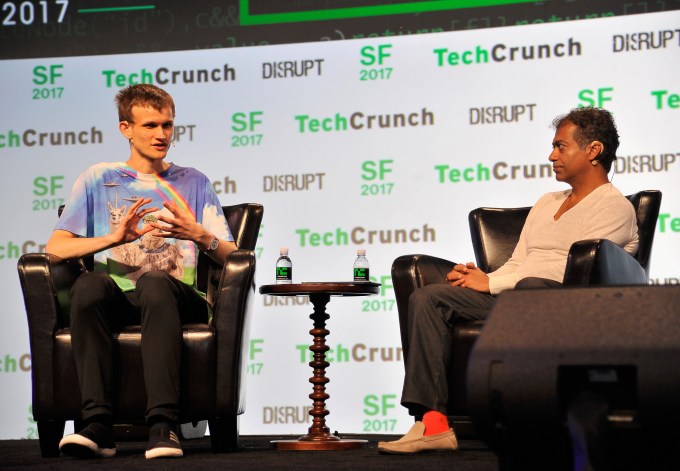
Ethereum’s original team of five — Vitalik Buterin, Anthony Di lorio, Charles Hoskinson, Mihai Alisie, and Amir Chetrit — grew to eight in August 2014 as Joe Lubin, Gavin Wood, and Jeffrey Wilke joined in. The Ethereum Foundation has roughly 90 full-time contributors focused on research, blockchain development, implementations, and grants.
Some of the most ambitious projects today in crypto have come out of the initial founders group: Cardano (Charles Hoskinson), Polkadot (Gavin Wood, Ken Kappler), ConsenSys (Joseph Lubin), and Jaxx (Anthony Di Iorio). Additional EF spinouts include Nervos (Jan Xie), Torus (Leonard Tan, Zhen Yu), Oaken Innovations (Hudson Jameson), Alchemist (Steven Nerayoff), and Raiden Network (Heiko Hees).
ConsenSys
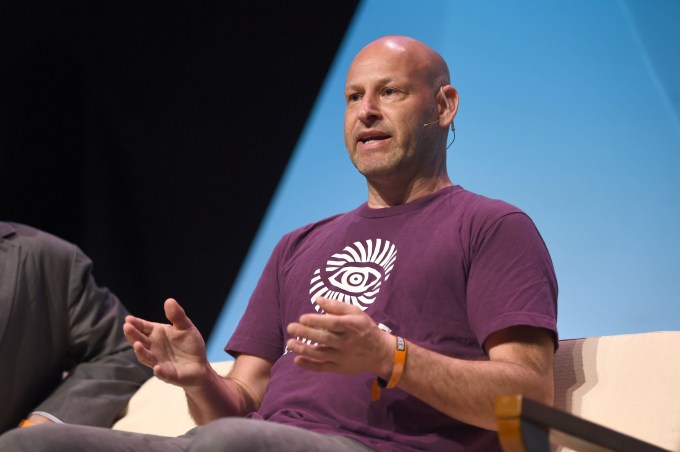
Disclosure: ConsenSys Ventures is one of my former employers.
Founded in late 2014 by Joe Lubin, ConsenSys is one of the largest organizations in crypto, surpassing 1000 employees in 2018. ConsenSys has incubated well-known projects in the space such as MetaMask, Gnosis, and Infura.
The line between incubation and employees leaving to start new companies is blurred. Excluding incubated companies, entrepreneurs who spun out of ConsenSys and started crypto companies include SuperRare (John Crain), Terminal (Harrison Hines), Spankchain (Ameen Soleimani), Vulcanize (Rick Dudley), Darma Capital (Andrew Keys, James Slazas), Coin Metrics (Tim Rice), Torus (Zhen Yu, Leonard Tan), and Tiger Trading (Alan Keegan).
Runner-ups
Blockchain — Binance founder CZ spent time at Blockchain as Head of Development before launching Binance in late 2017. Other projects which came out of Blockchain include Interchange (Dan Held, Clark Moody) and QJ Wang of Queschain, before her current role as Executive Director of the Ethereum Foundation.
DCG — Messari (Ryan Selkis), CoinShares (Meltem Demirors).
Kraken — Europe’s largest crypto exchange Kraken has had less entrepreneurial talent dissemination than I had expected. The most notable Kraken alum is Michael Gronager, co-founder of Chainalysis, followed by James MacWhyte creator of Breadwallet, Jack Liu of RelayX, and Kazuyoshi Mishima of Keychain.
NEO — Ontology, Nebulas.
R3 — Tezos, Coase (Kathleen Breitman).
OKCoin — RelayX, Binance, Bibox, Coinbene, Bytom.
Ripple — commonly known for XRP, Ripple Labs has produced a few high profile companies and alumni including Stellar (Jed McCaleb), Tron (Justin Sun), Interledger, Coil (Stefan Thomas, Ben Sharafian), and Fractal Investments (Tim Lewkow). Fun fact: Vitalik applied for an internship at Ripple in 2013.
Voltaire Hacks — Decentraland, Zeppelin, Nomic Labs.
Emerging crypto mafias from tech companies
Analyzing tech spinouts was the most difficult category given the sheer size of these organizations. I admittedly had to upgrade to LinkedIn Recruiter status with the thousands of LinkedIn profiles I viewed. Additionally, there is a significant amount of crossover between Facebook, Google, Microsoft, Amazon, and Yahoo with talent spending one to two years at each before moving on.
Mountain View-based tech behemoth Google was the largest producer of entrepreneurial crypto talent, with 11 crypto companies started by ex-Googlers.
Notable companies include Basis (Nader Al-Naji, Lawrence Diao), TrustToken (Rafael Cosman), Harmony (Stephen Tse, Minh Doan), Near Protocol (Illia Polosukhin), CoinTracker (Chandan Lodha, Jon Lerner), FalconX (Raghu Yarlagadda), Loopring (Daniel Wang), CertiK (Ronghui Gu), Prysmatic Labs (Preston Van Loon), Gifto, and Nebulas.
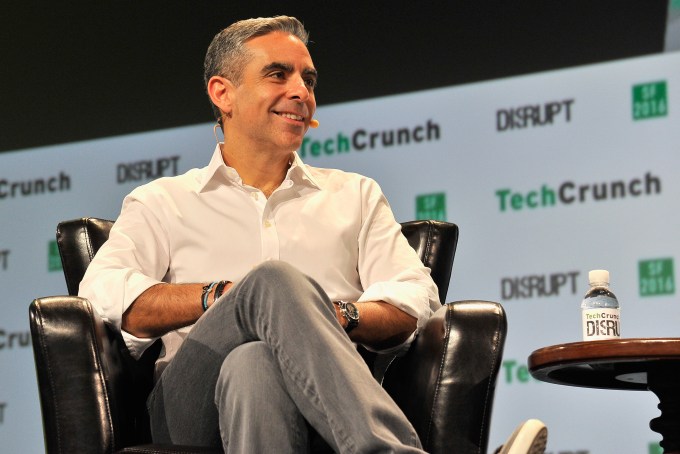
Although Libra has flooded headlines since its recent unveiling, Facebook has had a number of past employees go start crypto companies.
Some of the companies founded by ex-Facebook employees include Near Protocol (Evgeny Kuzyakov), Vault (John Egan, Cole Potrocky), Bitwise (Hunter Horsley, Hong Kim), YGC Capital (Henry Liu), Morgan Creek Digital (Anthony Pompliano), BitGo (Ben Davenport), and Electric Capital (Curtis Spencer, Avichal Garg).
AngelList

AngelList launched in 2010 to democratize startup investing, eventually expanding to syndicates, talent, and has been the platform where some of tech’s most reputable companies have raised capital. Notable crypto companies to spin out of AngelList include CoinList (Naval Ravikant), Republic (Ken Nguyen), DragonFly Capital Partners (Alex Pack), and Battlestar Capital (Adam Carver).
Microsoft
Microsoft, the largest company in the world by market capitalization, tied with AngelList for third within tech mafias. Crypto startups to spin out of Microsoft include Dharma (Brendan Forster), TrustToken (Tory Reiss), Near (Alex Skidanov), and Dirt Protocol (Yin Wu).
Runner-ups
Airbnb — Coinbase (Brian Armstrong), SFOX (Akbar Thobhani).
Amazon— IDEX, Harmony (Leo Chen).
Apple — Qokka.ai, WeTrust, Harmony (Alok Kothari).
IBM — FBG (Shouji), IDEX (Alex Wearn).
Paypal — Simplex, Origin.
Snapchat — Hashletes (Michael Anderson, Brennan Erbeznik), Morgan Creek Digital (Pomp).
Palantir — Interstellar (Brit Yonge), OpenSea (Alex Atallah), Lydian Capital (Eric Denovitzer).
Pinterest — OpenSea (Devon Finzer), Alchemy (Joseph Lau).
SecondMarket — DCG, Grayscale Investments, Coindesk.
Wall Street is also driving a huge network of crypto founders
Goldman Sachs
Wall Street juggernaut Goldman Sachs has not disappointed in fostering entrepreneurial talent in crypto.
Notable alums have gone on to start some of the world’s largest financial crypto companies including Bitflyer (Yuzo Kano), Coinbase (Fred Ehrsam), Tagomi (Greg Tusar), as well as crypto-native Tezos (Arthur Breitman), and UMA Protocol (Hart Lambur).
In addition, there have been a few funds from ex-Goldman employees, notably Paradigm (Fred Ehrsam) and BlockTower (Matthew Goetz). Jill Carlson spent three years at Goldman Sachs before joining Chain, and recently co-founded Open Money Initiative. The Solidus Labs team worked at GS before starting Solidus in 2017. Princeton roommates Joe Lubin (Ethereum, ConsenSys) and Mike Novogratz of Galaxy Digital spent time at the firm in the late 90’s.
J.P. Morgan
In crypto, J.P. Morgan often takes flak for Jamie Dimon’s negative comments on Bitcoin in 2017. The Wall Street powerhouse has ventured beyond the typical corporate blockchain R&D budget and is ramping up initiatives, including JPM Coin (atop Quorum) as well as research for Layer 2 privacy (zero knowledge proofs). Both Jamie Dimon and J.P. Morgan seem to be slowly coming around to open source, permissionless infrastructure.
Notable crypto spinouts from JP Morgan include Kadena, Clovr (Amber Baldet), Fundstrat (Thomas Lee), and SafeChain (Rob Zwink).
Deutsche Bank
Germany-headquartered Deutsche Bank has been less aggressive than J.P. Morgan in servicing blockchain / crypto, but has still fostered a few notable spinouts in the space. These include Bitmex (Arthur Hayes), Delphi Digital (Anil Lulla, Medio Demarco), and Storj (John Quinn).
Runner-ups
Citibank — Bitmex (Arthur Hayes).
CME — Altonomy (Ricky Li), Global Blockchain Business Council (Sandra Ro).
D.E. Shaw — Gauntlet, Basis.
DRW — 0x (Amir Bandeali).
Fidelity — Castle Island, Coin Metrics.
Fortress — Galaxy Digital.
Jane Street — Coda (Izaak Meckler), Alameda (Sam Bankman-Fried).
Visa — Torus.
Academia
Stanford

As alma mater to the founders of the largest technology companies today, it’s not surprising that Stanford also came in at number one for entrepreneurial talent in crypto.Many founders initially came out of the Stanford Bitcoin Group, although interest in crypto has now permeated into the business school and within certain advanced degree programs.
Stanford has been a kingpin in producing crypto entrepreneurs, producing Filecoin (Juan Benet, Jesse Clayburgh), CoinList (Andy Bromberg), Dharma (Nadav Hollander), Vest (Zach Lawrence, Axel Ericsson), TrustToken (Rafael Cosman), Zether (Benedict Bunz), Beam.io (Ryne Saxe), Audius, Harmony (Nick White), OpenSea (Alex Atallah), Meta Networks (Ilya Mouzykantskii), Alchemy (Joseph Lau, Nikhil Viswanathan), Merkle Data (Louis Baudoin, Shihao Guo) and Unit-e (David Tse).
MIT

Cambridge-based MIT landed as a close second behind Stanford in fostering crypto entrepreneurial talent. A number of initiatives driving crypto awareness at MIT include the annual MIT Bitcoin Expo and Jeremy Rubin and Dan Elitzer’s MIT Bitcoin Club (started in 2014) all complemented by dedicated space like the MIT Media Lab and academic research out of the MIT Digital Currency Initiative.
University alumni and professors who have launched crypto projects include Enigma (Guy Zyskind, Can Kisagun), Algorand (Silvio Micali), Unit-e (Mohammad Alizadeh, Leonid Kogan), Celo (Rene Reinsberg, Marek Olszewski), Celer Network (Qingkai Liang), ZCash (Madars Virza), Conduit (Ryan Robinson), Floating Point Group (John Peurifoy, Kevin March), Aelf (Zhuling Chen), Mist (Mirza Uddin), Honeyminer (Noah Jessop), Streambed Media (Michael Casey), and Alameda Research (Sam Bankman-Fried).
UC Berkeley
I was surprised to see just how many crypto projects hailed from UC Berkeley, and noticed many of these spinouts were involved with Blockchain at Berkeley, founded in 2016. Students, professors, and employees have gone on to launch Oasis Labs (Dawn Song), TrustToken (Stephen Kade), ZCash (Alessandro Chiesa), Dekrypt Capital, Opyn (Alexis Gauba, Zubin Koticha), Starkware (Alessandro Chiesa), Forte (Kevin Chou), Cosmos, Unit-e (Jiantao Jiao), TokenData (Ricky Tan), Set Protocol (Felix Feng, Alex Soong), and Synthetic Minds (Saurabh Srivastava).
Runner-ups
Cornell — Cornell is home to IC3 (at Cornell Tech in NYC), which is one of the first blockchain-focused academic initiatives. Alums and professors of Cornell have gone onto to create Avalanche (Emin Gun Surer), Thunder Protocol, Oasis Labs, Town Crier, Tezos (Kathleen Breitman), and Numerai (Richard Craib).
Harvard — notable companies from Harvard undergrads since 2009 are Prsymatic Labs (Raul), CoinTracker (Chandan Lodha), Logos (Michael Zochowski). Harvard Business School graduates since 2009 have gone on to start FalconX (Prabh Reddy, Raghu Yarlagadda). Sahil Dewan joined Harmony’s founding team, Jeth Soetoyo founded Rupiah Token, and Mark Lurie started Codex Protocol.
Princeton — Princeton’s distributed systems department is one of the hotbeds for talent in the space, although students and professors come from all parts of campus. Notable examples are Blockstack (Ryan Shea, Muneeb Ali) Arbitrum, Basis, DyDx (Antonio Juliano) and CoinList (Brian Tubergen).
Technion — Starkware, ZCash (Eli Ben-Sasson).
University of Waterloo — Ethereum (Vitalik Buterin), CoinTracker (Jon Lerner).
Yale — Veil, Kadena (Will Martino), CertiK.
Conclusion
Of the four early-forming crypto mafias, Coinbase, Facebook, Goldman Sachs, and Stanford are the top destinations (within their respective categories) if you’re looking to start a crypto company. The combined spinouts from these four totaled 54 spinouts, or 29% of the 186 spinouts counted.
Academia produced more spinouts than Crypto, Tech, and Wall Street since 2009, which makes sense given the sheer size of universities combined with multi-disciplinary roots on campus (home to professors, business school students, computer science, etc.).
It will be interesting to see if others follow Coinbase’s approach of a seven-year exercise option window (compared to 90 day industry average), which offers employees a larger incentive to start a new company versus staying put. Time will tell if Coinbase retains this clause as the space becomes more competitive, or if other newly-forming crypto mafias will follow suit.
I’m excited to continue tracking talented employees at newly forming crypto mafias, and will leave you all with one of my favorite quotes:
“I have learned more in the streets than in any classroom.” -Don Vito Corleane
This article undoubtedly missing a number of incredible entrepreneurs building in the space, so if you know of any that I’ve missed, please do submit them here so that I can update this post.
Special thanks to Sarah Downey, Linda Xie, Spencer Noon, Katherine Wu, and Imran Khan and Mohamed Fouda from Token Daily for looking at versions of this article.
Footnotes
- To be listed in top 3 or as a runner-up, company or university had to have at least two spinouts since 2009.
- Excluding data prior to Bitcoin’s launch in 2009 is not perfect, although covering a decade past employment or enrollment felt sufficient in putting this piece together.
- Places like Y-Combinator, Polychain, DCG, and Blockchain Capital could be considered mafias in many instances, but were not listed given the small number of full-time employees within each organization.
- Charlie Lee started Litecoin pre-Coinbase, Nadav Hollander was an intern at Coinbase so were not included in Coinbase’s section.
- A number of executives in the space are extremely entrepreneurial, yet were not listed if they were not original founders. This includes the likes of Aya Miyaguchi, Executive Director of the Ethereum Foundation and advisor to Blockchain.info, Blythe Masters previously CEO of Digital Asset Holdings (ex-JP Morgan), and Steve Kokinos, CEO of Algorand, Jason Chlipala now COO at Interstellar, Philip Martin CISO at Coinbase, Sameer Dhond who’s GC at Ripple, and Facebook’s Morgan Beller who leads strategy for Libra.
- Organizations like Fidelity, Square, E-Trade, and Robinhood are making meaningful contributions to the space, although were not considered as crypto is not their core business…yet.
- Outside the four mafia categories covered, large consulting firms had a few spinouts of their own including Aion’s founding team, and Nicholas Moy from Harbor (ex-Bain & Company), Duncan Foster of Nifty Evangelist (ex-Accenture), and Jutta Steiner, co-founder of Parity (ex-McKinsey).
- Princeton had a surprisingly impressive cast of alums in crypto, many of which attended Princeton undergrad or received advanced degrees pre-2009, including Mike Novogratz, Joe Lubin, Dan Boneh, Sharon Goldberg, Dan Morehead, Gavin Andresen, Ben Davenport (BitGo), and Bart Stephens.
- If more than two members of a founding team worked or attended a mafia together, I decided only to include the name of their spinout.
- I used commonly used Company names, rather than their lesser known entity names (ie Raiden Network vs. Brainbot Technologies)
- 1 hit wonders: Groupon — Livepeer (Doug Petkanics, Eric Tang). Prosper — Ripple (Chris Larsen). Soundcloud — OScoin (Eleftherios Diakomichalis). Zenefits — Harbor. IDEO — Open Money Initiative (Jamaal Montasser). Etsy — Bison Trails. Abobe — Circle. LinkedIn — Hub (Eric Ly). Yahoo — Oasis Labs (Bobby Jaros). ebay — Dfinity (Tom Ding). Mozilla — Brave Browser. University of Toronto — Chainsafe. Duke — Casa (Jeremy Welch). Northwestern — BloxRoute. Boston University — Arwen. University of Illinois Urbana-Champaign — Unit-e. Vchain — Qtum. Steem — EOS (Dan Larimer). BitPay — Bloq (Jeff Garzik). Lightning Labs — Handshake (Joseph Poon). InBlockchain — Primitive Ventures. Docker — Anchorage (Diogo Monica, Nathan McCauley). Square — Anchorage (Diogo Monica, Nathan McCauley). Zenefits — Harbor (Arisa Amano, Josh Stein).































Comment